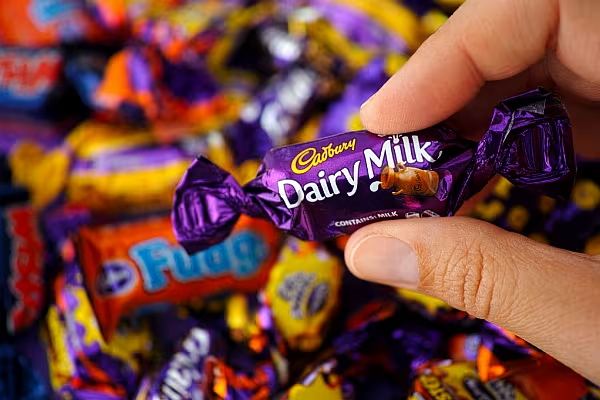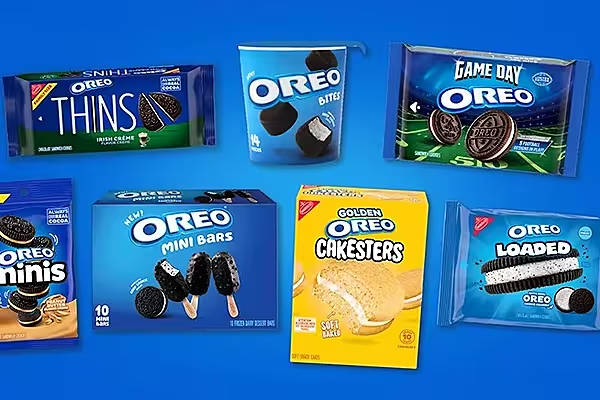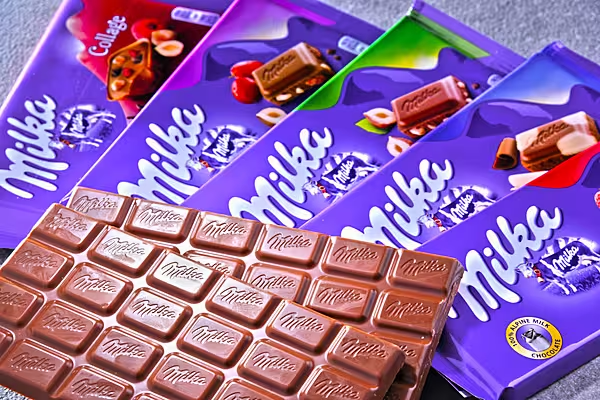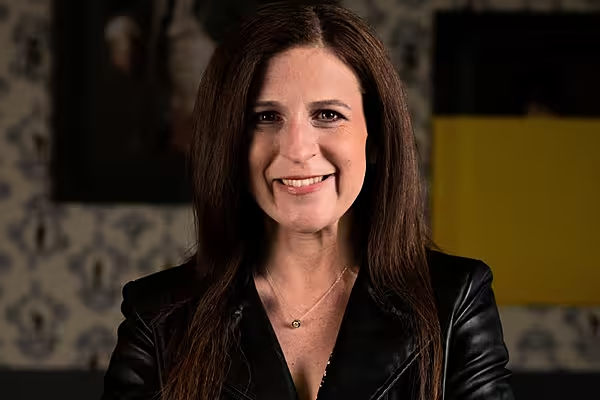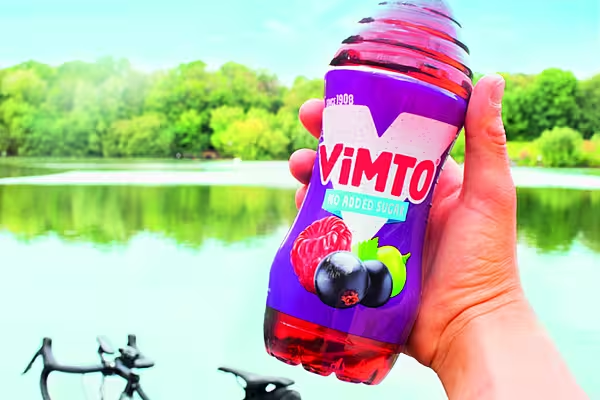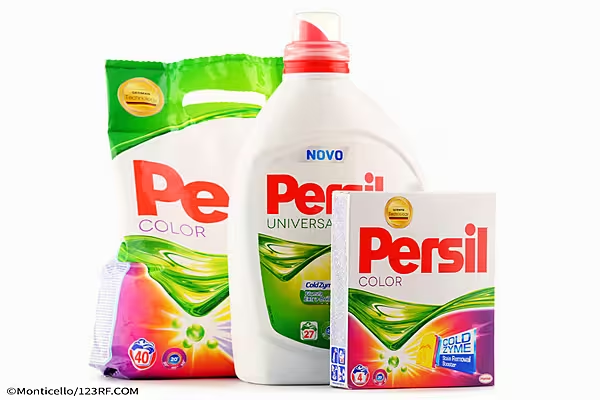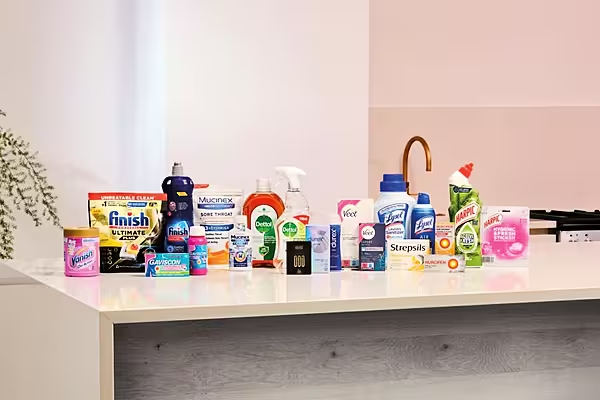Mondelez International Inc. spent the past two months trying to coax Hershey Co. into accepting a takeover bid, a deal that would have created the world’s largest candy company.
With those discussions dead, Mondelez is facing a very different outcome: It may become a target itself.
The snack giant, known for Oreos, Triscuits and other household brands, could have used the $23 billion Hershey merger to bulk up and ward off potential acquirers. But the company said Monday there was “no path forward” to a deal and walked away from discussions. The question now for Chief Executive Officer Irene Rosenfeld is if there are any other buyout candidates -- and whether getting swallowed by a bigger food giant such as Kraft Heinz Co. is inevitable.
“There really aren’t many obvious options,” said Ken Shea, an analyst at Bloomberg Intelligence. “Hershey was a unique opportunity. They were willing to do it because it was an obvious fit.”
Without a Hershey deal on the horizon, Mondelez has to cope with a sluggish food industry and overseas headwinds on its own. The Deerfield, Illinois-based company, which generates about 75 percent of its revenue outside North America, has been hurt by the strong U.S. dollar and slowing international economies. While Rosenfeld is turning to cost cuts to bolster earnings, activist investors have been looking for a more transformative move. Renewed pressure may again put the company in the cross hairs of a larger rival.
Kraft’s Shadow
The name most often mentioned is Kraft Heinz, the packaged-food giant formed in a 2015 merger orchestrated by the private equity firm 3G Capital and Warren Buffett. The prospect of a Kraft Heinz takeover is one reason Mondelez shares rose on the news that the Hershey deal was dead, Chris Growe, an analyst at Stifel Financial Group, said in a note. Investors saw Hershey as a barrier to a bigger prize: a buyout of Mondelez.
“Investors seeking an opportunity from a combination of Mondelez and Kraft Heinz likely saw this transaction as extremely prohibitive,” Growe said.
A Kraft deal would reunite two businesses that were once under the same roof. Mondelez split from Kraft Foods in 2012, a breakup that was intended to help the companies hone their focus and bring greater shareholder returns. Mondelez was set up to sell snacks in emerging markets, where a burgeoning middle class would gobble up Oreos and Cadbury chocolate. Kraft, meanwhile, would concentrate on the slower-growing domestic market.
Domestic Appeal
But economic challenges overseas, particularly in Brazil and China, have been hard on Mondelez. The U.S., in contrast, has been a surprisingly attractive market. That was part of the rationale for Mondelez trying to acquire Hershey, which generated almost 90 percent of its revenue in North America last year. The talks stalled after Hershey asked buyout negotiations to begin at $125 a share, according to a person familiar with the discussions. That was well above the $115 Mondelez offered, the person said. The nonprofit trust that controls Hershey was another obstacle to a deal.
Rosenfeld, 63, said on Monday that Mondelez may still pursue its own acquisitions. And there are some possibilities, according to Pablo Zuanic, an analyst at Susquehanna International Group. The company could try to buy a European candy maker -- or look to a regional U.S. business that would expand its natural and organic snack offerings. Instead, it’s more likely that Kraft Heinz will swoop in, he said in a note.
Clock Ticking
“In the end, we think Mondelez will just run out of time and be taken over,” Zuanic said.
Part of the reason Mondelez is considered vulnerable is its profit margins have lagged those of food-industry rivals. Bill Ackman, the billionaire hedge fund manager, took a large stake in Mondelez last year and called for Rosenfeld to improve the company’s performance.
There is pressure across the U.S. food industry to boost margins. Consumers have shifted away from products that dominated grocery store shelves for decades, hurting the profitability of iconic brands. Though companies are trying to refine their product portfolios, they’re also relying more heavily on cost cutting.
Zero-Based Budgeting
3G, the Brazilian investment firm, has led the way. After orchestrating the takeover of H.J. Heinz -- and then Kraft -- 3G’s managers have imposed zero-based budgeting, an increasingly popular form of belt tightening that forces employees to justify every cost. At Kraft Heinz, they have slashed spending on travel, electricity and even office supplies.
The approach helped produce industry-leading margins at H.J. Heinz after 3G took it private in 2013. When 3G and Buffett acquired Kraft two years later, they began the process over again there.
To keep pace, Mondelez has sought $3 billion in cost cuts by 2018. Like its food-industry competitors, the company has relied on zero-based budgeting to trim its travel and technology budgets. But it hasn’t been enough to satisfy investors. Prior to the stock’s rally Tuesday, the shares had slumped 4 percent this year.
Barring another defensive move, a reunion with Kraft Heinz may be coming, Shea said. With a valuation of about $70 billion, Mondelez would be out of reach for most other suitors.
“There’s a small number of companies who could afford it,” Shea said. “Kraft Heinz is most obvious one -- you’re starting to hear a lot of buzz about what they’re going to do.”
News by Bloomberg, edited by ESM. To subscribe to ESM: The European Supermarket Magazine, click here.
